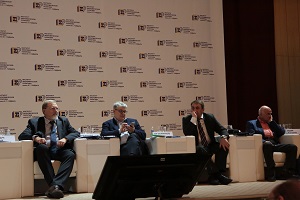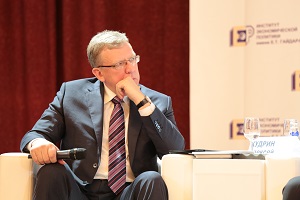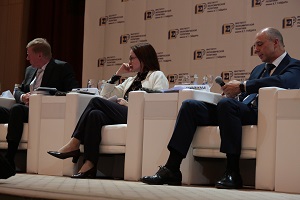23.10.2015 – Gaidar Readings Dedicated to the 25th Anniversary of Gaidar Institute
On 23 October 2015, Gaidar Readings – “Exploring the Present, Look into the Future” – dedicated to the 25th anniversary of the Gaidar Institute was held in Moscow.
The participants’ attention was focused on the challenges the Russian economy encountered at present, as well as the prospects of identification of Russia’s new model of economic development. In particular, Abel Aganbegyan, Head of the Department of Economic Theory and Policy of the RANEPA pointed out that the potential of economic growth in Russia was concentrated in the knowledge-based economy, the motor industry and housing development. Abel Aganbegyan stressed that Russia should switch over to a new economic policy of accelerated investment in those sectors.

Elaborating on the topic of investments, Аlexei Ulyukaev, Minister of Economic Development of the Russian Federation said that the existing draft federal budget was an unbalanced one due to reduction of investment expenditures in productive sectors. “It does not matter whether it is -3% or -2.5% this year, it matters that the share of productive expenditures and investments in human capital are constantly falling, while the share of nonproductive expenditures is growing”, the Minister said.
Alexei Ulyukaev called for not to reduce expenditures which form the future of the economy, that is, investments in human capital: education and healthcare. According to Alexei Ulyukaev, a potential source of investments is companies’ account balances and deposits of individuals and legal entities. However, it is important to ensure a favorable investment climate which depends largely on the government’s readiness to take a portion of investment risks in order to make that instrument work.
Аndrei Nechaev, Member of the Board of Trustees of the Yegor Gaidar Fund and Former Minister of Economy of Russia (1992–1993) noted that Russia’s macroeconomic indices started to fall fr om 2012 and then an explicit nose-dive trend emerged. A factor behind those developments was the emphasis made by the government in the 2000s on prevalence of state-run companies in the real sector. In its turn, protection of private property and independence of the judicial system may promote investment demand.
Аndrei Klepach, Deputy Chairman of the Vnesheсonombank stated that there was a lack of an efficient mechanism of balancing of the interests of the fuel and energy complex and the economy in general.
Yaroslav Kuzminov, Rector of the NRU Higher School of Economics believes that unless changes in the dynamics of investments take place in the near future Russia may happen to find itself in the group of backward countries with a low level of social guarantees.
According to Yaroslav Kuzminov, with a lack of reforms in the social sphere the Russians are likely to receive a much lower level of social guaranties than that they have at present. To prevent it, liberal reforms both in the social and economic spheres are required. “All the factors point to the radical -liberal scenario of development for the economy and the society in general”, he noted.
In his speech, Alexander Auzan, Dean of the Department of Economics of the Lomonosov Moscow State University drew attention to the problem related to the short horizon of planning of the Russian economy which prevents development of long-term strategic plans and large-scale reforms.
Yevgeny Yasin, Academic Advisor of the NRU HSE pointed out that to ensure effective functioning of the economy and industrial growth it is important to realize the principle of supremacy of law and ensure political competition.
The second session of the Gaidar Readings – “Institutional Reforms: the State and Evolution” – was dedicated to a search for mechanisms ensuring efficiency of the institutional environment. Аlexei Kudrin, Chairman of the Board of Trustees of the Gaidar Institute, Former Minister of Finance was the moderator of the second session.

Elvira Nabiullina, Chairman of the Central Bank of Russia was the first to address the session. In her speech, she pointed to the need of developing the institute of competition and transparency in taking of managerial decisions.
Elvira Nabiullina believes that low rates on loans will not result automatically in growth in investments. At the same time, she noted that enterprises had funds which they could invest in production as in H1 the profit of enterprises rose by 40%. However, enterprises are not prepared to invest which situation is evidence of the crisis of confidence. Also, E. Nabiullina pointed out that it was important to promote the role of nonbanking assets: unit investment funds and insurance and pension funds.
In his report Аnatoly Chubais, Head of the ROSNANO touched upon the issue of differences between Russia and the West as regards participation of private property in formation of the economic agenda. According to Anatoly Chubais, in the existing situation political decisions are needed for solution of economic problems. “At present, a key to solution of Russia’s underlying problems is beyond the limits of the economy. If one speaks about such fundamental principles as protection of private property and fair competition and trial, the key to those issues is in the politics”, A. Chubais said.
Due to the above, A. Chubais has advised to refer to the Constitution of the Russian Federation which includes all the provisions needed for functioning of state institutions. “We have a very good Constitution, one’s heart fills with joy when one reads it ... but wh ere is life?” – he said.
Аnton Siluanov, Minister of Finance, said that the state should seek to redistribute less funds through the budget system and leave more funds with economic entities.
Anton Siluanov drew attention to a negative trend – the aggregate volume of funds redistributed through budgets of all the levels and budget funds amounted at present to 40% of GDP, while in 2006 that index was equal to 31%.
“We should not be afraid of giving up the entire range of expenditures, carrying out structural reforms, abandoning the whole range of subsidies to the economy and switching over to a target social aid. We understand that we have to do that in the long-term prospect. If we fail to do that we shall not be able to finance that volume of liabilities we have at present”, A. Siluanov said.
Anton Siluanov noted that “it is necessary to relieve a tax burden on business and leave funds with it”. “That is the only way of stimulating growth in our economy”, A. Siluanov said.
In his report, Маxim Reshetnikov, Minister of the Government of Moscow, Head of the Department of the Economic Policy and Development touched upon the issue of reduction of expenditures on the state machine and a shortage of investments in technologization of the management process and administration in the sphere of proprietary rights, cadastre, register and taxation.
Joining the panel discussion of the Gaidar Readings, Igor Shuvalov, First Deputy Chairman of the Government of the Russian Federation said that the problems of the Russian economy were primarily related to the lack of a strategic vision with the authorities and public conscience, rather than the quality of institutions, low level of confidence in the state on the part of the general public or political limitations. It is to be noted that according to Igor Shuvalov an important role in formation of the agenda of tomorrow should be attached to the civil society which is to form a request to the authorities. “So, my request is aimed at formation of such a critical mass which puts forward a request for another standard of behavior because willingness to live differently is enormous. But the desire to live differently and that to do something for it are quite different things. One can, certainly, formalize that through multiplicity of institutions, while it can be simply identified as a need of transformation of the public consciousness. Do we have base institutions and the base volume of the economy to achieve that important shift, quick changes? I am confident we have”, I. Shuvalov said.
Also, the First Premier pointed out that the authorities were responsible for taking decisions and maintaining of the equilibrium. “You know, there are plenty ideas to establish such new Gasproms! Chernomyrdin carried out once his transformation of the ministry into a corporation and at present there is a proposal, for example, to abolish the Ministry of Communications and establish a state-owned corporation. People come and propose that seriously and many other things, too. But it is our responsibility to ensure stability. For those who create a product, new quality and value, the rules of conduct should be stable”, I. Shuvalov said.
I. Shuvalov is confident that the government has succeeded so far in maintaining the stability of the rules; otherwise “we would have lived in complete idiocy”.
